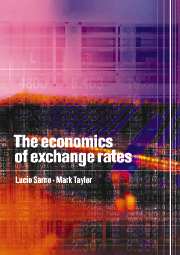Book contents
- Frontmatter
- Contents
- Foreword by Jeffrey A. Frankel
- Preface
- 1 Introduction
- 2 Foreign exchange market efficiency
- 3 Purchasing power parity and the real exchange rate
- 4 Exchange rate determination: theories and evidence
- 5 New open-economy macroeconomics
- 6 Currency unions, pegged exchange rates and target zone models
- 7 Official intervention in the foreign exchange market
- 8 Models of currency crisis and speculative attack
- 9 Foreign exchange market microstructure
- Author index
- Subject index
7 - Official intervention in the foreign exchange market
Published online by Cambridge University Press: 05 September 2012
- Frontmatter
- Contents
- Foreword by Jeffrey A. Frankel
- Preface
- 1 Introduction
- 2 Foreign exchange market efficiency
- 3 Purchasing power parity and the real exchange rate
- 4 Exchange rate determination: theories and evidence
- 5 New open-economy macroeconomics
- 6 Currency unions, pegged exchange rates and target zone models
- 7 Official intervention in the foreign exchange market
- 8 Models of currency crisis and speculative attack
- 9 Foreign exchange market microstructure
- Author index
- Subject index
Summary
Official intervention in the foreign exchange market occurs when the authorities buy or sell foreign exchange, normally against their own currency, in order to affect the exchange rate. Whether, by what means, by how much and for how long the authorities can affect the exchange rate through intervening in the market are questions of crucial policy importance and a vast academic and policy-related literature has grown up in order to address them.
Given its policy importance, it is perhaps not surprising that this literature has been the venue for a substantial and ongoing economic controversy. In so far as a consensus is discernible among economists and policy-makers concerning the effectiveness and desirability of exchange rate intervention, it appears to have shifted several times over the past quarter of a century. At the time of the collapse of the Bretton Woods adjustable peg exchange rate system in the early 1970s, when the impotence of the authorities to hold the parities in the face of massive speculative attack had apparently been demonstrated only too well, the profession appeared strongly to favour a pure float, involving zero intervention. The 1970s experience with floating exchange rates among the major industrialised countries, and the ensuing volatility of both nominal and real exchange rates, however, led to a shift in this consensus so that, by the late 1970s, both economists and policy-makers – particularly of countries which had suffered a substantial loss in competitiveness – frequently criticised the US authorities for not intervening in support of the dollar.
- Type
- Chapter
- Information
- The Economics of Exchange Rates , pp. 208 - 244Publisher: Cambridge University PressPrint publication year: 2003



